The macaw parrot cage is more than just a physical enclosure; it becomes a sanctuary miming their natural habitat while offering the necessary space, stimulation, and security. Within this carefully chosen cage, your macaw will spend a significant portion of its time engaging in activities such as flying, climbing, playing, and simply observing its surroundings.
Here we will explore the various elements that contribute to creating the ultimate macaw parrot cage. From understanding the specific needs and behaviors of macaws to selecting the right cage size, materials, and accessories, we will guide you through the essential considerations that makes the exception cost from the macaw parrot price. By implementing these guidelines, you can ensure your macaw parrot cage’s well-being, happiness, and overall quality of life, while fostering a deep and lasting bond with your feathered friend.
Tips For Selecting Macaw Parrot Cage
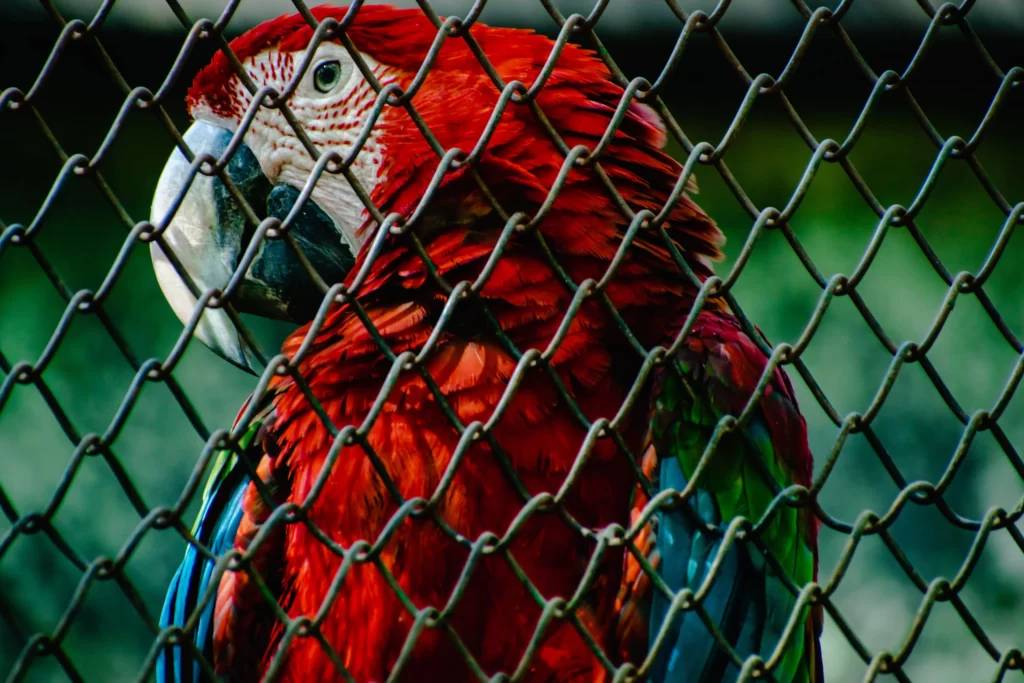
As a responsible macaw owner, providing a suitable cage is crucial for your pet’s well-being and happiness. A macaw parrot cage should be more than just a confined space; it should mimic their natural habitat, offer ample room for exercise, and include various stimulating elements. Consider the essential factors when selecting and setting up a macaw parrot cage, ensuring your feathered friend’s comfort, safety, and overall quality of life.
Understand Macaw Behavior
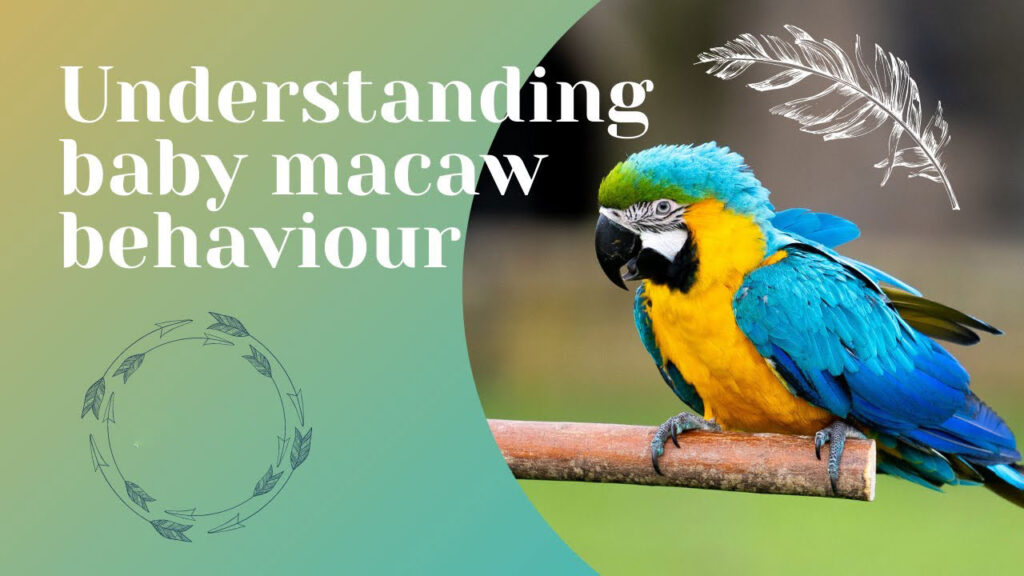
To provide the best care for your macaw parrot, it is crucial to have a deep understanding of its behavior and instincts. By comprehending their needs and tendencies, you can create an environment that promotes their well-being and allows them to thrive.
Social Nature:
Macaws are naturally social creatures that form strong bonds with their human caregivers and other members of the household. They crave interaction, attention, and companionship. Spending quality time with your macaw, talking to them, and engaging in activities together helps satisfy their social needs and strengthens the bond between you.
Intelligence and Curiosity:
Macaws are brilliant birds, capable of problem-solving and learning complex tasks. They possess a curious nature and require mental stimulation to prevent boredom. Providing various toys, puzzles, and activities challenging their cognitive abilities is essential to keep them mentally engaged and happy.
Vocalizations and Communication:
Macaws are renowned for their impressive vocal abilities. They can mimic human speech and various sounds, including whistles, tunes, and environmental noises. Vocalizations serve as a form of communication for macaws, expressing their emotions, seeking attention, or warning of potential threats.
Chewing and Beak Strength:
Macaws have strong beaks designed for cracking nuts and chewing tough foods. Chewing is a natural behavior that helps keep their beaks healthy and sharp. Provide your macaw with safe and bird-appropriate chew toys made of sturdy materials, such as untreated wood or bird-safe acrylic.
Playfulness and Exercise:
Macaws are active birds that require ample physical exercise to maintain their well-being. They love climbing, swinging, and exploring their surroundings. Providing a spacious Macaw Parrot Cage with plenty of room for movement and incorporating perches, ladders, and swings can help satisfy their need for exercise and play.
Need for Routine and Enrichment:
Macaws thrive on a consistent routine, providing security and stability. Establishing a daily schedule for feeding, social interaction, playtime, and rest can help keep your Macaw Parrot Cage content and reduce stress.
Selecting the Right Cage Size
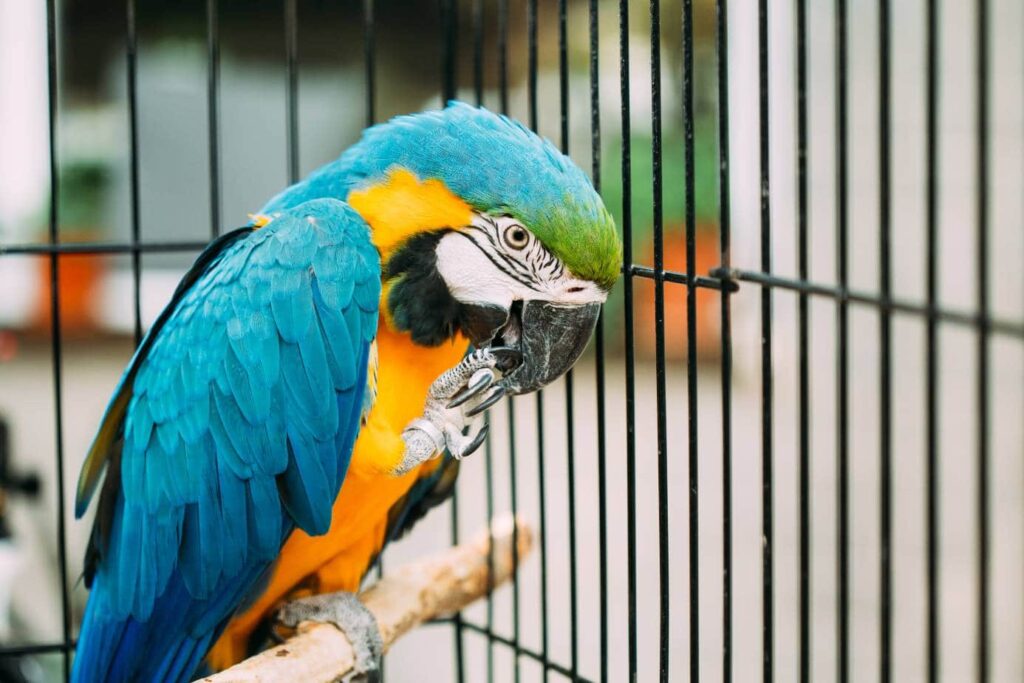
A spacious and comfortable Macaw Parrot Cage allows macaws to engage in natural behaviors, exercise their wings, climb, and play, ultimately contributing to their overall happiness. This section will delve into the factors to consider when selecting the right cage size for your macaw.
Understanding the Needs of Macaw Parrots
Macaws are highly active birds that require ample space to move around and stretch their wings. Their natural habitat consists of vast rainforests, where they can fly long distances and explore their surroundings. When confined to a Macaw Parrot Cage, providing them with enough room to mimic these behaviors is essential. Macaws are known for their impressive wingspans, ranging from 2/4 feet, depending on the species. Understanding their biology is crucial when determining the appropriate cage size.
Guidelines for Cage Size
As a general rule of thumb, the Macaw Parrot Cage should be at least twice the wingspan of your macaw. This measurement ensures your bird can fully extend its wings without hitting the cage’s walls or accessories. However, remember that providing extra space is always beneficial and encouraged. Macaws are intelligent birds that require mental stimulation and physical exercise to thrive. A larger cage allows for more freedom of movement and provides opportunities for your macaw to explore, climb, and engage in natural behaviors.
Accommodating Different Macaw Species
Macaw species vary in size, with some being larger than others. For instance, the Hyacinth macaw, the largest of all macaw species, requires an even more spacious Macaw Parrot Cage due to its substantial size. If you have a Hyacinth macaw or another large macaw species, choosing a cell that exceeds the minimum guidelines for length is recommended. Research the specific requirements of your macaw’s species to ensure you provide the best living environment for your pet.
Vertical Space
In addition to width and length, vertical space is essential in a macaw cage. Macaws are skilled climbers and enjoy exploring their environment from various heights. Ensure the Macaw Parrot Cage measurement is sufficient for your macaw to move up and down comfortably without any restrictions.
Room for Accessories and Mobility
Remember that a macaw cage is not just a space. It should accommodate various accessories, such as perches, toys, food bowls, and water dispensers. These items take up space within the Macaw Parrot Cage, so ensure you choose a size that includes these essential elements without making the cell feel cramped.
Cage Materials and Construction
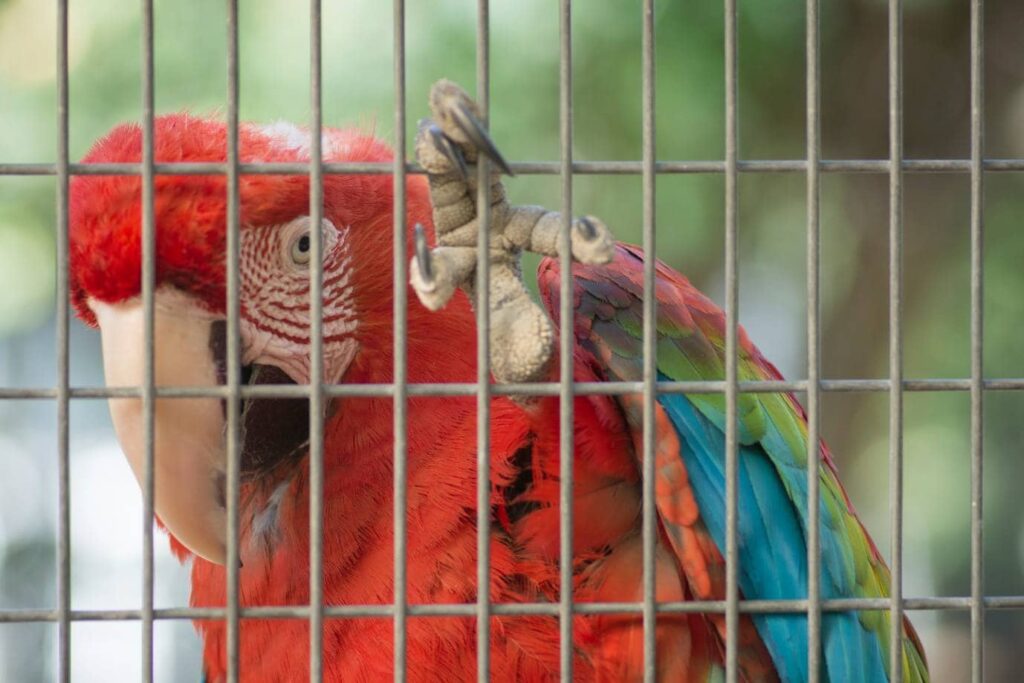
When it comes to selecting a macaw parrot cage, the choice of materials and the construction of the cage are vital considerations. Macaws are strong birds with powerful beaks, so choosing a cage that can withstand their natural behaviors and provide a safe environment is essential. Here are some factors to keep in mind:
Sturdy and Durable Materials:
Macaw parrots are known for their chewing abilities, and they will undoubtedly put their beaks to work in their cage. It’s crucial to opt for cages constructed from sturdy and durable materials that can withstand their beak strength. One of the best options is stainless steel. Stainless steel cages are incredibly durable and resistant to corrosion, ensuring longevity and easy maintenance.
Non-Toxic and Bird-Safe:
To safeguard your macaw’s health, choosing a cage made from non-toxic materials is vital. Like many other parrots, Macaws have a habit of chewing on various surfaces within their enclosure. Ensure the cage and its components, such as bars, trays, and accessories, are free from toxic substances or coatings. Avoid cages made of materials like zinc or lead, as these can be harmful if ingested by your macaw.
Bar Spacing and Gauge:
The spacing between the bars of the cage is another critical consideration. The gap should be narrow enough to prevent your macaw from getting its head or body stuck between the bars. Typically, for macaws, the recommended bar spacing is around 1/1.5 inches (2.5 to 3.8 cm). It’s important to ensure the bars are strong and adequately welded to prevent bending or breakage.
Locking Mechanisms:
Macaws are intelligent birds and are adept at figuring out how to manipulate Macaw Parrot Cage doors and latches. Therefore, choosing a cage with secure locking mechanisms is crucial to prevent any accidental escapes. Look for cages with sturdy locks or latches that are out of your macaw’s reach and cannot be easily tampered with.
Cage Placement and Environmental Considerations
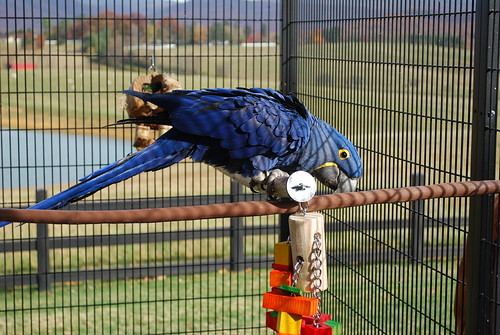
Providing the right location and ensuring a suitable environment within your home can significantly impact your macaw’s well-being and overall happiness.
Central and Social Placement:
Placing your macaw’s cage in a central area of your home is beneficial for several reasons. Macaws are highly social creatures and enjoy being part of the family dynamic. By locating the cage in a central space, your macaw can observe and interact with household activities, fostering a sense of belonging.
Avoidance of Drafts and Direct Sunlight:
It is essential to protect your macaw from potentially harmful environmental factors. Avoid placing the Macaw Parrot Cage near windows or doors where drafts create uncomfortable temperature fluctuations. Macaws are sensitive to temperature changes, and exposure to currents can lead to stress or respiratory issues. Place the Macaw Parrot Cage away from direct sunlight or use curtains or blinds to regulate the amount of sun entering the area.
Temperature Control:
Macaws thrive in a stable temperature range of approximately 65°F to 80°F (18°C – 27°C). Extreme temperature variations can be detrimental to your macaw’s health and well-being. Avoid placing the Macaw Parrot Cage near air conditioning vents or heating sources, as these can create temperature imbalances within the cage.
Low-Stress Environment:
Macaws are intelligent and wise birds that can be easily affected by stressful situations. Avoid placing the cage in high-traffic areas with constant noise, such as near televisions, stereos, or busy hallways. Excessive noise and commotion can cause anxiety and disrupt your macaw’s peace of mind.
Cage Accessories and Enrichment
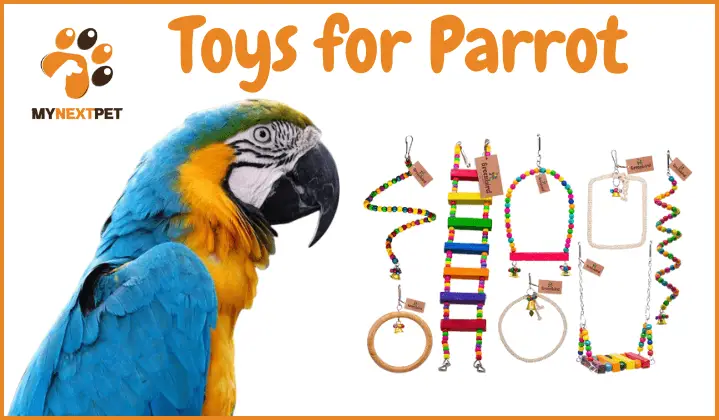
Perches: Macaws love to perch and exercise their feet, so providing sturdy perches of different sizes and materials is important. Natural wood branches make excellent perches as they mimic the texture and feel of tree branches in the wild. Ensure the perches are appropriately sized to allow your macaw to grip them comfortably.
Swings and Ladders: Macaws enjoy the thrill of swinging back and forth. Install a few durable swings in the Macaw Parrot Cage to provide your macaw with a fun and relaxing activity. Ladders are also great for encouraging climbing and exploration within the cage.
Rope Toys: Macaws are natural climbers, and rope toys can simulate the feeling of climbing on branches. Hang thick, bird-safe ropes inside the Macaw Parrot Cage to allow your macaw to exercise and swing.
Puzzle Toys and Foraging Opportunities: Macaws are highly intelligent birds that thrive on mental stimulation. Introduce puzzle toys and foraging opportunities to keep their minds engaged. These toys can challenge their problem-solving skills and prevent boredom. Hide treats or their favorite fruits and vegetables within the toys to encourage foraging behavior.
Chewing Toys: Macaws have strong beaks and enjoy chewing on objects. Provide a variety of bird-safe chewing toys made of wood, acrylic, or stainless steel. These toys will help keep their beaks healthy and satisfy their natural chewing instincts. Rotate the toys regularly to maintain their interest.
Mirror and Bells: Macaws are social birds and enjoy the presence of companions. Place a bird-safe mirror in the cage to give your macaw the illusion of having a companion. Additionally, hanging bells can provide auditory stimulation and entertainment.
Maintaining Hygiene and Cleanliness
A clean and hygienic living environment is vital for the health and well-being of your Macaw Parrot Cage. Regular maintenance of their cage ensures their physical health and contributes to their mental and emotional well-being.
Regular Spot Cleaning:
Droppings, uneaten food, and debris can accumulate in your macaw’s cage daily. To prevent the spread of bacteria & maintain a clean environment, perform spot cleaning at least once or twice a day. Use gloves and a scooper or disposable paper towels to remove any waste.
Weekly Deep Cleaning:
In addition to daily spot cleaning, schedule a weekly deep cleaning session. Remove all accessories, perches, and toys from the cage and wash them with mild bird-safe soap or a specially formulated bird cage cleaner. Rinse them thoroughly to remove any residue, and allow them to air dry completely before returning them to the cage.
Preventing Mold and Mildew:
Macaws are susceptible to respiratory issues, and the growth of mold and mildew can worsen their condition. To prevent mold and mildew, ensure the cage and accessories are completely dry before reassembling the setup. Avoid using excessive amounts of water during cleaning, as moisture can accumulate, creating a breeding ground for mold.
Maintaining Perches and Toys:
Perches and toys are integral components of your macaw’s cage, providing exercise, mental stimulation, and entertainment. However, they can also harbor bacteria and dirt over time. Inspect perches and toys regularly for signs of wear and tear, such as frayed ropes or chipped wood. Replace any damaged items promptly to prevent injuries to your macaw.
Water and Food Dishes:
Water and food dishes should be cleaned daily to prevent bacterial growth. Use bird-safe dish soap and warm water to wash the dishes, removing any remaining food particles or residue. Rinse them thoroughly to ensure no soap residue remains. Consider having multiple sets of words to allow for easy rotation and cleaning. If you want to buy macaw parrot cage online visit here.
FAQs
What size cage is suitable for a macaw parrot?
Macaw parrots require spacious cages to stretch their wings and move around comfortably. A general guideline is to choose a cage at least twice your macaw’s wingspan. Larger macaw species like the Hyacinth macaw may require even larger enclosures.
What materials are best for a Macaw Parrot Cage?
Stainless steel cages are highly recommended for macaw parrots. They are durable, easy to clean, & resistant to corrosion. Avoid cages made of zinc or lead, as these materials can be toxic to macaws.
How do I ensure the cage bars are the appropriate spacing for my Macaw Parrot Cage?
The gap between the bars should be narrow enough to prevent your macaw from getting stuck or injured. As a general rule, the spacing should be no wider than the width of your macaw’s head. If you need more clarification, consult with a reputable avian veterinarian or an experienced bird specialist to determine the appropriate bar spacing for your specific macaw species.
Can I use natural branches as perches in my Macaw Parrot Cage?
Natural branches can be used as perches, as they provide a more varied and stimulating environment for your macaw. However, ensure the branches are free from pesticides, chemicals, or parasites. Clean and inspect the branches regularly to ensure they remain safe and in good condition.
How often should I clean my Macaw Parrot Cage?
Daily spot cleaning is recommended to remove droppings, uneaten food, and debris. Perform a weekly deep cleaning, which involves removing all accessories, perches, and toys and thoroughly cleaning them with mild bird-safe soap or a specially formulated bird cage cleaner. The cage bars, trays, and grates should also be wiped down with a bird-safe disinfectant.
Can I use household cleaners to clean my Macaw Parrot Cage?
It is good to avoid using household cleaners, as they may contain chemicals that can be toxic to birds. Instead, opt for bird-safe cleaning products designed explicitly for cage cleaning. These products are formulated to be safe for birds while removing dirt, bacteria, and debris.
Can I put my Macaw Parrot Cage outside?
Macaws should not be exposed to extreme temperatures or drafts. It is generally recommended to keep their cage indoors, in a well-ventilated area away from sunlight, heaters, air conditioning vents, and windows.
Conclusion
Providing a suitable macaw parrot cage is paramount to ensure the well-being and happiness of your feathered companion. Select a cage with ample space, secure construction, and appropriate bar spacing. Pay attention to cage placement, temperature control, and environmental considerations. Enrich the cage with various accessories and toys to stimulate your macaw mentally. Regular cleaning and hygiene maintenance are vital for your macaw’s health.

